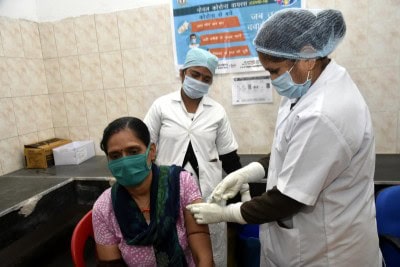Beijing, Jan 9 : A new study has found that more than three-quarters of Covid-19 patients have at least one ongoing symptom six months after initially becoming unwell.
The study, published in the prestigious journal The Lancet, reveals that 76 per cent of patients reported at least one ongoing symptom.
Fatigue or muscle weakness was reported by 63 per cent, while 26 per cent had sleep difficulties and 23 per cent experienced anxiety or depression, the Wuhan-based study indicated.
“Our analysis indicates that most patients continue to live with at least some of the effects of the virus after leaving the hospital, and highlights a need for post-discharge care, particularly for those who experience severe infections,” said Bin Cao, Professor at the Capital Medical University in Beijing, China.
For the study, the team involved 1,733 Covid-19 patients who had a median age of 57 years. Follow-up visits were done and the median follow-up time was 186 days.
All patients were interviewed face-to-face using questionnaires to evaluate their symptoms and health-related quality of life. They also underwent physical examinations, lab tests, and a six-minute walking test to gauge patients’ endurance levels.
390 patients had further tests, including an assessment of their lung function. In addition, 94 patients whose blood antibody levels were recorded at the height of the infection as part of another trial received a follow-up test.
Of the 390 patients who underwent additional testing, 349 completed the lung function test (41 were unable to complete the test due to poor compliance). Patients with more severe illness commonly had reduced lung function, with 56 per cent of those at severity scale 5-6 (who required ventilation) experiencing diffusion impairment — a reduced flow of oxygen from the lungs to the bloodstream.
For patients at severity scale 4 (who required oxygen therapy) and those at scale 3 (who did not require oxygen therapy) the figures were 29 per cent and 22 per cent, respectively.
Patients with more severe disease performed worse in the six-minute walking test (which measures the distance covered in six minutes), with 29 per cent of those at severity scale 5-6 walking less than the lower limit of the normal range, compared with 24 per cent for those at scale 3, and 22 per cent for scale 4.
The authors also found that some patients went on to develop kidney problems post-discharge. As well as the lungs, Covid-19 is known to affect other organs, including the kidney. Lab tests revealed that 13 per cent of patients whose kidney function was normal while in the hospital had reduced kidney function in the follow-up.
Follow-up blood antibody tests from 94 patients after six months revealed that levels of neutralising antibodies were 52.5 per cent lower than at the height of infection. The authors say this raises concerns about the possibility of Covid-19 re-infection.
Disclaimer: This story is auto-generated from IANS service.

